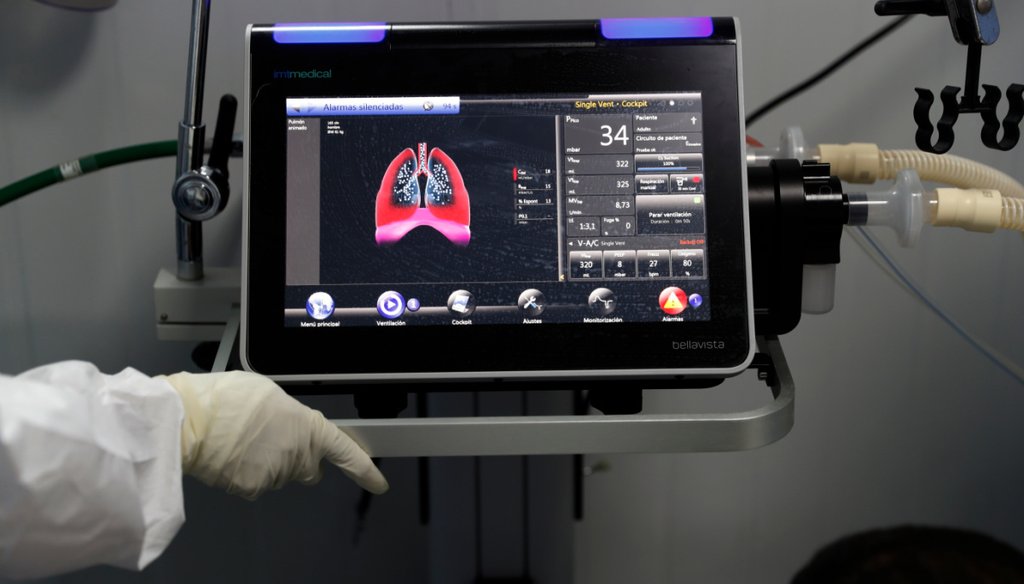

Our only agenda is to publish the truth so you can be an informed participant in democracy.
We need your help.


A ventilator's monitor displays oxygen entering the lungs of a COVID-19 patient in an intensive care unit of the National Hospital in Itaugua, Paraguay, March 17, 2021
The claim cites a Northwestern University study as evidence that ventilators killed nearly all COVID-19 patients. One of the study’s authors told PolitiFact the claim is inaccurate.
The study focused on the effects of ventilator-associated pneumonia and found it was a contributing factor, not a direct cause, of death.
At the COVID-19 pandemic’s onset, ventilators were widely used for patients with the virus who couldn’t breathe on their own. But social media posts are spreading the false claim that ventilators were the primary cause of death for "nearly all" of those patients.
Social media users shared a screenshot of a headline: "Official Report: Ventilators Killed Nearly ALL COVID Patients," with the subheadline: "Nearly all COVID-19 patients who died in hospital during the early phase of the pandemic were killed as a direct result of being put on a ventilator, a disturbing new report has concluded."
The headline also gained traction on Twitter. It was flagged as part of Meta’s efforts to combat false news and misinformation on its News Feed. (Read more about our partnership with Meta, which owns Facebook and Instagram.)
The headline originated on The People’s Voice, a website that has previously spread misinformation. Its May 13 article pointed to a Northwestern University study as evidence that ventilators killed patients. But one of the study’s authors, Dr. Benjamin Singer, told PolitiFact the claim is inaccurate.
The study reviewed cases of ventilated patients with COVID-19-related pneumonia and other forms of pneumonia and respiratory illness. Singer, an associate professor of medicine at Northwestern University, said the researchers found that patients who had COVID-19-induced pneumonia were much more likely to contract a secondary illness, called ventilator-associated pneumonia. COVID-19 patients contracted the secondary pneumonia at a rate of 57.4% compared with patients with other forms of pneumonia (25%).
Ventilator-associated pneumonia contributed to patients’ deaths, but it wasn’t the primary cause of death — that was COVID-19.
"The analogy would be if you have a set of patients who are bleeding to death from an automobile accident, right, so a cohort of trauma patients are all taken for surgery to try to stop the bleeding, but a certain number of them die during the surgery to stop the bleeding. You wouldn't say that the surgery killed the patient, you would say that they died from a car crash," Singer told PolitiFact.
Ventilators were in high demand at when the pandemic started. Some early data suggested low survival rates for patients who were on them. But, in the second half of 2020, the survival rates of patients on ventilators began to increase.
Northwestern’s April 27 study was conducted by researchers at the university’s Feinberg School of Medicine who observed cases of ventilator-associated pneumonia and tracked when the pneumonia was unsuccessfully treated. The secondary pneumonia infection can occur in patients who are on a machine for more than 48 hours, according to a study published by StatPearls, a health care education and technology company.
Using a computer program called CarpeDiem, the researchers at Northwestern studied the cases of 585 patients with severe pneumonia and respiratory failure, 190 of whom had COVID-19, and those who had contracted the secondary ventilator-associated pneumonia after 48 hours or longer.
People whose cases of secondary pneumonia were treated successfully had a better chance of survival than those who did not respond to treatment, Singer said. Of 585 patients whose treatments were observed in the study, 243 died — 87 of whom had COVID-19.
"While (ventilator-associated pneumonia) was not associated with mortality overall, mortality was higher in patients with one episode of unsuccessfully treated VAP compared with successfully treated VAP," the authors wrote.
Overall, the study showed that ventilator-associated pneumonia that didn’t respond to treatment contributed to a higher risk of mortality — but COVID-19 was the primary cause of death.
Social media posts claimed that "ventilators killed nearly all COVID-19 patients."
The claims cited a Northwestern University study as evidence. But the study’s author said the claim is inaccurate.
Researchers studied ventilator-associated pneumonia, including in patients with COVID-19. They found that while ventilator-associated pneumonia contributed to a higher risk of mortality, it was not the primary cause of death — COVID-19 was.
We rate the claim that ventilators killed nearly all COVID patients False.
CORRECTION (May 25): This story has been updated to correct the source of one piece of information. The information was published by StatPearls, a healthcare education and technology company.
Instagram post, May 18, 2023
Instagram post, May 19, 2023
Twitter post, May 13, 2023
The People’s Voice, Official Report: Ventilators Killed Nearly ALL COVID Patients, May 13, 2023
Factcheck.org, Misinformation Directory, July 6, 2017
The Journal of Clinical Investigation, Machine learning links unresolving secondary pneumonia to mortality in patients with severe pneumonia, including COVID-19, April 27, 2023
USA Today, GM, Tesla tackle ventilator shortage amid coronavirus pandemic, March 22, 2020
Reuters, Ventilators: a bridge between life and death? April 22, 2020
StatPearls, Ventilator-associated Pneumonia, accessed May 19, 2023
Yale Medicine, Ventilators and COVID-19: What You Need to Know, June 2, 2020
The Washington Post, More covid-19 patients are surviving ventilators in the ICU, July 3, 2020
Phone interviews with Dr. Benjamin Singer, associate professor of medicine at Northwestern University, May 19-22
In a world of wild talk and fake news, help us stand up for the facts.
